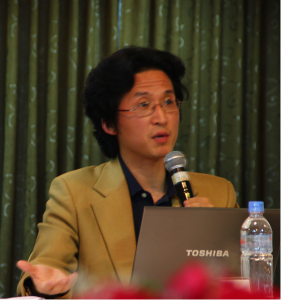Negotiating cyber security, surveillance and hate speech: Keynote speech by Prof. KS Park – #SAFoE
by Richa Kaul Padte
This blog post is third in a series of ten blog posts to report on the 'Third South Asian Meeting on the Internet and Freedom of Expression' recently concluded in Dhaka, Bangladesh.
When it comes to hate speech, the incitement to harm comes from the underlying power structures of the society in which the speech is said and heard. – KS Park
Keynote speaker KS Park, Executive Director at the PSPD Public Interest Law Centre in Korea and Professor, Korea University Law School, framed country perspectives on cyber security and surveillance through a global and rights-based approach to the issue.
When considering measures of security and surveillance, it is perhaps pertinent to ask, ‘security from what, and surveillance to prevent what?’ Park goes on to explain that in a democratic country the elected state is meant to represent the people; however, this does not mean that all measures of surveillance are acceptable or in the ‘people’s interests’. There must be a limit to what even a democratically elected state can do, and therefore the principles of human rights become essential to providing a framework for state and society to interact. These are ‘the values that should be fiercely defended even if our democratically elected leaders think they should be dispensed in the name of security’, surveillance, or protection.
Park draws attention to the history of human rights in the context of 1948, when following Hitler’s democratic rise to the power and the subsequent atrocities of the Holocaust, it became essential to define something that could not be destroyed by majoritarian agreement. Applying this to virtual spaces, Park says, ‘we cannot [just] blame surveillance and security measures themselves – they are natural defences to cyber crimes. But those measures should be designed in a way [that is] consistent with human rights. [What we need is] a rights-based approach.’ The fundamental human rights of privacy, free speech, and the appropriate punishment of hate speech must be adhered to at all times, to thus provide the framework with which to create legal and extra-legal responses that put individuals at the heart of the conversation. In order to effectively implement this, Park once again asks the meeting to return to a discussion around hate speech itself, and how it may be globally defined.
The UN Human Rights Counsel provides guiding principles on the ICCPR (International Covenant on Civil and Political Rights) from which a clearer understanding of the notion of hate speech and free speech through a rights-based perspective can be derived. Park advocates that in order ‘to make hate speech law consistent with human rights, it has to be an anti discrimination law. Discrimination laws already ban discrimination, but as an extension to those laws, they can also ban incitement to that discrimination. This is how a hate speech law should be structured.’ The inclusion of discrimination into an understanding of hate speech is also effective in making the distinction between hate speech and counter speech, as well as taking into account the power structures that exist between majority and minority groups within a society.
Park provides pertinent examples in order to illustrate this point. For example, he says, ‘If Jews during the Holocaust said speech that incited hatred against the Nazis or Aryan people, it doesn’t count as hate speech, because there was no real and present danger.’ Counter speech presents no potential of violence, particularly as it plays out within unequal power relations between a ruling majority a country’s minority groups. In another example relevant to today’s context of rising Islamaphobia in the Western world, Park compares the burning of the Qu’ran in the United States as compared to the burning of the Qu’ran in the Middle East. In the former instance, it is the minority being attacked, whereas in the latter, it is the ruling majority. Therefore, the same speech or action may or may not constitute incitement to harm – and by extension be classified as hate speech – in different contexts of varying power relations.
It is through placing a high value and imperative on human rights to provide a framework – for both cyber security and surveillance as well as an understanding of hate speech – that conversations around and measures to foster the freedom of speech and expression can be truly effective on both a national and global scale.
